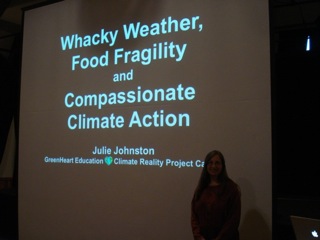Of course, that's got me wondering what sort of gift I would like to create for the world this year. As a teacher, I have two "new" years each year, one in September and one in January. My autumn new year is usually focused on new teaching strategies and learning experiences to share with my students.
But January 1st! Ah, what is it that sends so many of us off into the rite of rapturous resolution-making? I mean, every day is a new day, right? We could decide to start new projects, eat better, lose weight, stop a bad habit any day, couldn't we? But there's something about the very beginning of a new year that holds excitement and allure for us.
So here for all the world to see, I would like to pronounce my 2013 New Year's Resolution. I am going to become an Earth Mama!
I mentioned that to a friend yesterday and she laughed, asking "You want to have a baby?" "No, no!" I quickly replied. "That's not what I mean." Nor do I mean any of the other definitions I just found in the online Urban Dictionary. I'm not referring to the wonderful Joyce Johnson Rouse (aka Earth Mama) either, but check out her wonderful music.
Yikes, I'd better define this if I'm going to realize my dream. To me, an Earth Mama (or Earth Mother?) is a woman who is connected to the earth (and the Earth), who knows how to grow food, who cans and preserves the food she and others in her community grow, who fixes things around the house without having to call in expensive experts, who is confident in her own abilities to survive.
 |
| Me, in our school garden |
What's all this got to do with compassionate action on climate change? Well, the food crisis looms. Drought has become persistent in some of the world's greatest grain growing regions (American midwest, southwest China) and the whole world will soon see food shortages. We're going to have to start looking after our own food needs on a local basis.
When I see lawns, I see food gardens. When I see golf courses and school yards, I see food gardens. When I see leaves and grass clippings on the roadside, I see soil. When I see yard "waste" being burned, I see soil going up in smoke. And when I see children stuck in classrooms, I see future food growers not being taught the skills they are desperately going to need to survive.
So this is my year to, as the Gandhi-esque quote suggests, become the change I want to see in the world. I keep proclaiming that 21st century education needs to revolve around teaching kids how to build their own soil, grow their own food, collect their own rainwater, and generate their own energy. So that's my mission this year: to learn how to do all of those things.
If something is doable, then it's learnable. And if it's learnable — and I set my mind (and heart) to it — then I can learn it. Right? We're not talking rocket science here, just food growing and preserving, and composting, and setting up rain barrels, and learning about renewable energy technologies along with my students. I can do this.
Good luck with your resolutions this year. May your learning and your doing in 2013 be a gift to the world!






















